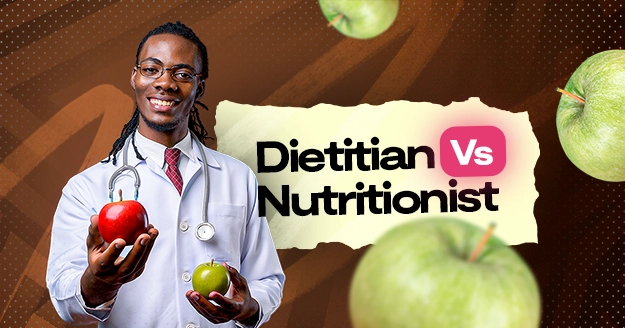Most likely, if you’re reading this, you’re wanting to modify something about your diet or lifestyle. You may have tried several diets or nutrition plans. You may have had some success, but not the long-lasting changes you were hoping for.
Perhaps you are now aware that working with a dietitian or nutritionist would be a crucial step in improving your health, but you are unsure which is best for you.
A dietitian and nutritionist both offer advice to clients on dietary concerns and healthy eating practices. A dietitian and nutritionist are experts in using food and nutrition to enhance health and treat illness. They organize and carry out food service and/or nutritional programs to promote healthy living.
Whom should you visit? A dietitian or a nutritionist? One of these professionals may be more suitable for you than the other, depending on your needs. In this article, let’s find out what’s the difference between dietician and nutritionist.
What’s a Dietitian?
A qualified specialist in diet and nutrition is known as a dietician. They hold a bachelor’s degree in nutrition science, have successfully completed a rigorous internship program that offers real-world clinical practice, and have passed the CDR (Commission on Dietetic Registration) exam.
Dietitians assist their patients in modifying their dietary regimens owing to medical problems, including diabetes, renal disease, and post-operative recovery according to medical recommendations. Clinical dietitians most often treat patients with substance misuse, eating disorders, or medical diseases whose symptoms can be managed or controlled by a more specialized diet or meal planning.
Dietitians carefully modify the patient’s diet to match their medical demands after carefully reviewing the patient’s health with them.
Dietitians often work at specialized healthcare facilities including
- Hospitals
- In- and outpatient clinics
- Schools
- Long-term care facilities
- Government health facilities
- Research facilities
- Sporting facilities
What’s a Nutritionist?
A nutritionist normally does not treat certain medical diseases and does not work in healthcare facilities like hospitals. Unlike dietitians, they are more concerned with aiding clients in meeting some of their fundamental nutritional needs as well as their weight loss objectives and lifestyle improvements.
Typically, nutritionists work with people or groups to increase their knowledge of basic nutrition, food, and health. They concentrate on eating habits. This involves collaborating with people to develop and carry out meal plans that enhance the person’s or family’s nutrition.
Although they are not obliged to complete an educational degree in nutrition, the credentials they have can vary. But to be recognized as a legal CNS or certified nutrition specialist, they must earn at least a master’s degree and pass a certification exam for nutritionists after putting in 1,000 hours of practice.
Nutritionists may work in:
- Jobs in the government, such as those at local health departments.
- School districts, to influence public policy surrounding school nutrition requirements and labeling,
- Private institutions, where they would operate independently and with other medical experts
- Sporting facilities
- Cafeterias
RD vs. RDN: What are the differences?
The terms “registered dietitian” (RD) and “registered dietitian nutritionist” (RDN) indicate the same thing. However, there is little distinction. The title “nutritionist” – the ‘n’ in RDN – was added to RD in order to include a wider definition of health as well as the diagnosis, prevention, and management of conditions. This difference emphasizes that while all registered dietitians are nutritionists, not all nutritionists are registered dietitians.
Dietitian vs Nutritionist: Whom Should You Visit?
You’ve found out the definition of dietitian and nutritionist. Now, let’s talk about nutritionist vs dietician.
Your overall health is greatly influenced by your diet. Both nutritionists and dietitians can assist you in making long-lasting changes for a healthier, better life. You could be more inclined to choose one or the other.
If you have medical needs (such as diabetes, renal illness, or cancer), you should consult a dietitian. However, if your goal is to build muscle, drop a few pounds, or simply enhance your health in general, you should see a nutritionist.
Nevertheless, dietitian vs nutritionist duties vary per state. State laws determine which duties each professional is qualified to carry out.
Other Nutrition Professionals
Another organization that grants certification for the title of certified clinical nutritionist (CCN) is the Clinical Nutrition Certification Board. Other nutritionists, such as holistic nutritionists and health coaches, don’t need to complete a rigorous training program. A few weeks of training with the American Council on Exercise or another recognized institution may be all that is required for someone to become a health coach.
Before taking a certification exam offered by the Holistic Nutrition Credentialing Board, holistic nutritionists with a specialization in functional nutrition must complete a course accredited by the National Association of Nutrition Professionals and accumulate 500 hours of practical experience.
Each state may have different licensing requirements. While some states exclusively license registered dietitians, others license nutritionists who have received certification from one of the boards mentioned above.








